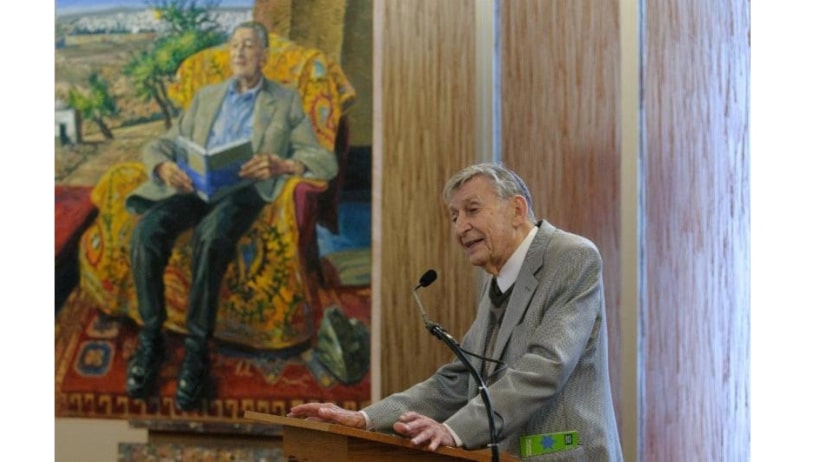Oasis Songs: Musings from Rav D
Friday, December 27, 2019 / 29 Kislev 5780
Rabbi Stampfer has left us.

For more than six and a half decades he has been our rabbi, our confidant, our friend and our teacher. He has built community and institutions. He has been our dugma, our role model for how to live an engaged and purposeful life. And now he has left us for what the tradition calls the olam shel emet, the world of truth.
So if our Sages imagined that what awaits us after we die is the world of truth, they were intentionally drawing a sharp distinction between it and our world, in which truth, integrity and kindness are sometimes lacking. That’s quite an indictment they made of human society and our darker impulses. It’s a judgment that sometimes feels rather stark and overblown, and sometimes, unfortunately, seems spot on, don’t you think?
What makes the difference between such a gloomy outlook and a more optimistic one? I think it’s the people we surround ourselves with. It comes down to how much goodness we discern versus how much evil we witness. For those who are invested in mindfulness, it’s about where we put our attention.
When you’ve had the privilege to know someone like Rabbi Stampfer, optimism gains the upper hand over cynicism. For here was a person burnished with goodness. Here was integrity. Here was concern for his fellow human beings. Here was living proof that every life matters and an example of how much one life can accomplish.
Rabbi Stampfer, you see, was a lion of Torah. In addition to being a man of action, he was a scholar who maintained an active life of the mind up to the very end. His Jewish learning was vast and broad and I don’t think most people really have a grasp for how learned he was. Even his students who regularly attended his classes only got to hear him skim from the top of his reservoir.
But being a lion of Torah isn’t just about how much learning you have. It’s about an approach to life. The very first law in the Shulchan Aruch, the chief authoritative legal code of the Middle Ages, commands us to “Arise like a lion to serve your Creator in the morning.” We are guided to live with certainty and courage and we achieve that by greeting each morning with those qualities.
Rabbi Stamper possessed such a positive spirit. He was a tzaddik, a genuinely righteous person.
Now that he is gone, we are left to carry on. We will bury him on Sunday afternoon (details to go out Friday, mid to late morning). We will observe not just shivah for him, but as a community, we will also observe shloshim, the thirty days of mourning following a loss. While the shloshim rituals are normally reserved for the seven closest of kin, it is extended when an important person leaves us.
During this period, we’ll engage in additional learning in his memory and his honor.
We will commit to supporting the Israel he hoped to see, by voting in the upcoming World Zionist Congress Elections.
We will decide together on a project to honor his values.
While those details are still to be worked out, we will begin this Saturday at 12:45—in the Stampfer Chapel. That is when I was scheduled to teach some customs about our Torah with an emphasis on what we are required to do when a Torah falls. It will now also provide us an opportunity to be together during our tremendous communal loss.
When a Torah falls, we have a duty to pick it up. Our Lion of Torah has fallen. It is our job to raise up his memory and strengthen his legacy. We will grieve. But we will also do that.
Writing to you from a place of deep sorrow,
Rav D
Shabbat Table Talk
- What is your favorite memory of Rabbi Stampfer?
- How did he impact you or your family?
If you’d like to continue this discussion, follow this link to CNS’s Facebook page to share your own perspectives on the topics raised in this week’s Oasis Songs. Comments will be moderated as necessary.



